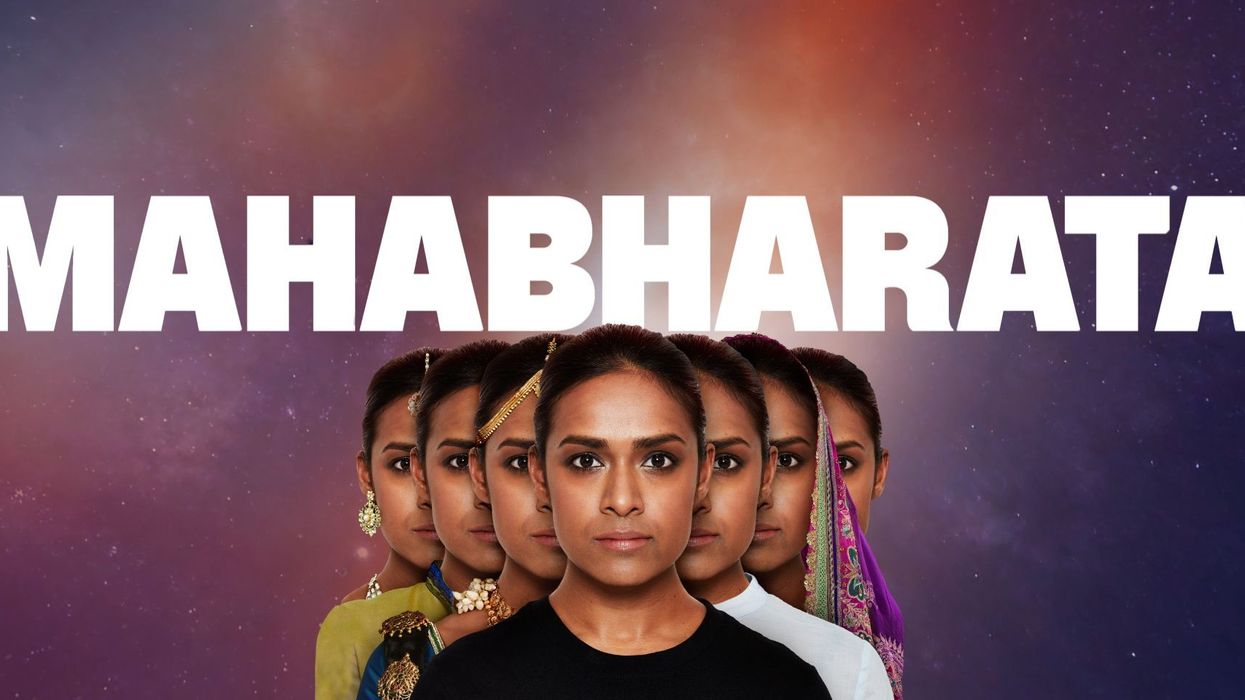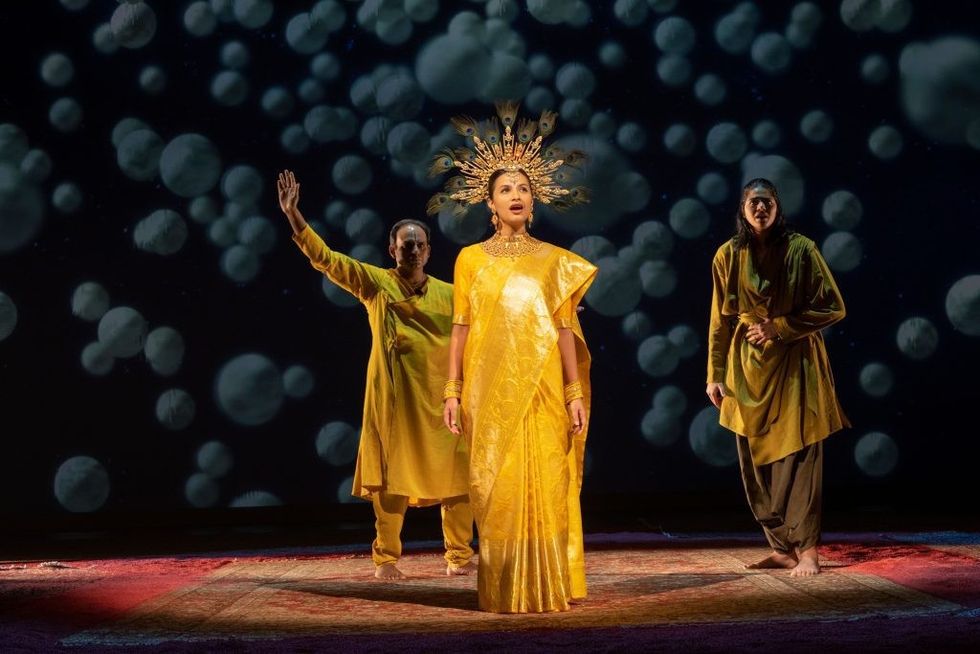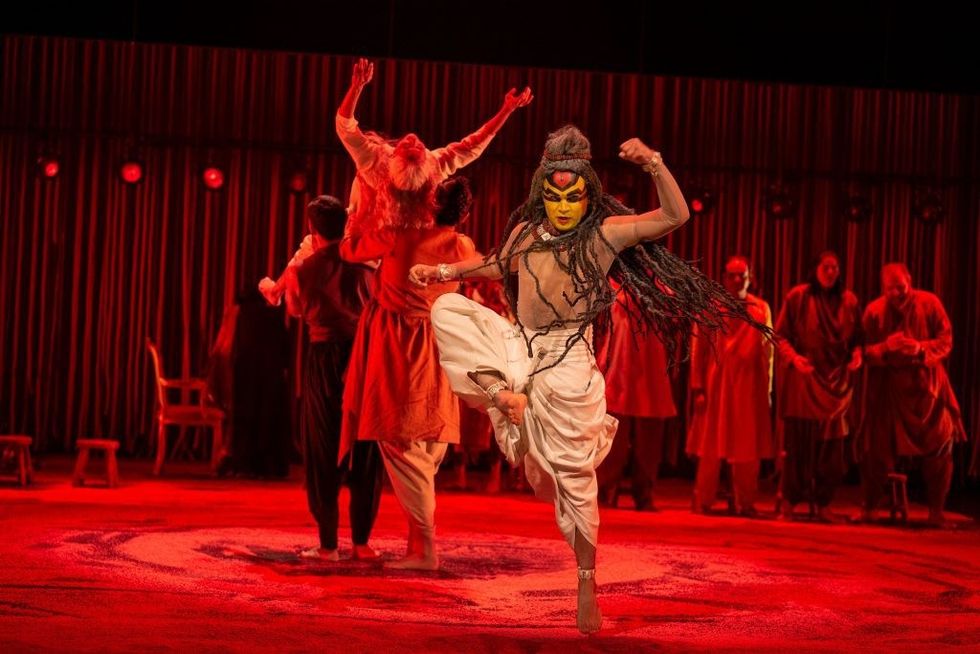Cast of 20 has been announced for Mahabharata, a spectacular retelling of the ancient Sanskrit epic, by Canada’s Why Not Theatre, which follows a devastating family feud and explores profound philosophical and spiritual ideas. Its stories are more than four thousand years old and foundational to Indian culture. The new, large-scale retelling by Toronto-based company Why Not Theatre is the first major international adaptation to be led by a company from the South Asian diaspora and makes its UK premiere at the Barbican Theatre this autumn (1 – 7 October). The world premiere was hailed by critics as “triumphant” (Toronto Star), “stunning” (Globe and Mail), and “Epic in every sense of the word.” (Intermission magazine) at The Shaw Festival Theatre in Niagara-on-the-Lake, Canada in March 2023.
The stories collected in ‘The Mahabharata’ span thousands of years and over 100,000 verses – almost four times as long as Homer’s ‘The Odyssey’ & ‘The Iliad’ combined, and eight times as long as the Bible. To this day, favourite moments, characters, and lessons are remembered and retold in the kitchens and temples of more than 1 billion people of India and its diaspora. These ancient stories continue to resonate powerfully today against a backdrop of territorial war, human rights violations, and climate change.
Almost 40 years since Peter Brook’s legendary production, Why Not Theatre’s adaptation takes audiences on a journey through the past in order to write a thrilling new future. Exploring the act of storytelling itself, the staging evolves from ancient and intimate – a storyteller around a fire and classical Kathakali dance – to a modern spectacle with projection, dynamic soundscapes, poetic stage design, and a new opera for the most revered portion of ‘The Mahabharata’, the Bhagavad Gita. A live onstage band creates the atmospheric music score, featuring traditional instruments from the Bansuri (bamboo flute, often depicted as a favourite of the Hindu god Krishna) to the Tabla (percussion, an essential element in music and dance performance across the Indian subcontinent).
The production is presented in two parts and narrated by a storyteller (Miriam Fernandes), a charismatic guide who weaves a path through the forest of stories. Karma (Part 1), is the origin story of the rival Pandava and Kaurava clans, illuminating the choices we inherit and how those choices impact generations to come. In Dharma (Part 2), a great battle destroys the planet and the survivors are left behind to rebuild.
Mahabharata is performed by a company from across four continents, all from the South Asian diaspora. Balancing East and West, traditional and contemporary, the production and ensemble highlight the complex hybrid nature of cultures in today’s globalised world and interconnected lives. The cast includes UK-based performers Ajay Chhabra (Rough Diamonds, Netflix), Neil D’Souza (How To Hold Your Breath, Royal Court), Darren Kuppan (Let The Right One In, Manchester Royal Exchange), Goldy Notay (Life of Pi, UK Tour) and Sakuntala Ramanee (Life of Pi, West End), who are joined by Canadian and other international performers Shawn Ahmed, Jay Emmanuel, Miriam Fernandes, Navtej Sandhu, Anaka Maharaj-Sandhu, Ellora Patnaik, Meher Pavri, Munish Sharma and Sukania Venugopal, and understudies Varun Guru, Karthik Kadam, Suma Nair, Ronica Sajnani and Ishan Sandhu. Performing in the live band are John Gzowski (Conductor/Co-Composer/Co-Sound Designer/Guitar), Suba Sankaran (Band Leader/Co-Composer/Co-Sounder Designer/Vocals), Dylan Bell (Bass/Keyboard), Gurtej Singh Hunjan (Percussion), Hasheel Lodhia (Bansuri/Vocals) and Zaheer-Abbas Janmohamed (Tabla).
Associate Director, Co-Writer, Storyteller and Why Not Theatre Co-Artistic Director, Miriam Fernandes, said: “We are a small strand among a great lineage of storytellers who have weaved this epic of 'The Mahabharata’ over the ages. These stories have been passed from storyteller to audience for thousands of years and span the earth, traveling in the memories and imaginations of the South Asian diaspora. Though first composed in an ancient time, the themes of greed, revenge, ecocide, and privilege feel acutely relevant in our globalized world.”
Director, Co-Writer and Why Not Theatre Founder and Co-Artistic Director, Ravi Jain, said: “As a student in London, I watched the world masters dazzle audiences on the Barbican stage. 20 years later it’s a dream come true to share this complex work we’re so proud of at this truly special venue.”
Toni Racklin, Head of Theatre & Dance at the Barbican, said: “We are thrilled to present this groundbreaking new production to our audiences, a masterclass in exhilarating stagecraft inspired by ancient oral traditions and poetry. We are honoured to welcome Why Not Theatre to our main stage for the first time, following their studio residency in 2019, and we hope that, for many of our audience members, Mahabharata will resonate with the stories that have been passed down for generations. Exploring the power of storytelling to understand where we’ve come from and to help us navigate our future, Mahabharata invites us to connect with perspectives from across the world and inspire us to reimagine what we can achieve together.”
The first sparks for the project started in 2015. Ravi Jain (Founding Artistic Director of Why Not Theatre) chose to adapt just one story (the Bhagavad Gita) within the sprawling Mahabharata for a commission by the intercontinental Pan Am Games. Backed by funding from Canada Council of the Arts, Ontario’s prestigious Shaw Festival Theatre then invited Ravi to ‘Dream Big’ and stage the entire epic poem. Having grown up with the Indian stories transplanted to a Canadian context, Ravi was inspired to dive deep into his past, taking inspiration from many South Asian sources as well as Peter Brook’s 1985 production. Ravi wanted to find a way to share this story with a modern audience by highlighting the myriad ways we tell stories. As part of Why Not Theatre’s deeply ingrained collaborative approach, Ravi teamed up with Miriam Fernandes (now Co-Artistic Director of Why Not Theatre). Together they built the script, drawing primarily from Carole Satyamurti’s ‘Mahabharata, A Modern Retelling’, Devdutt Patnaik’s ‘JAYA’, and the poetry of Rabindranath Tagore, but also pulling from wildly diverse perspectives and combining influences, including folk tales, street theatre, western European physical theatre (from their training at LAMDA and the Lecoq School and contemporary companies such as Simon McBurney’s Complicité and Ariane Mnouchkine’s Théâtre du Soleil), oral storytelling traditions, and the popular Indian staples they grew up with, such as Amar Chitra Katha’s Mahabharata comics and B. R. Chopra’s Mahabharata TV series.
Mahabharata is adapted by Why Not Theatre’s Founding Artistic Director Ravi Jain and Co-Artistic Director Miriam Fernandes, using poetry from Carole Satyamurti's ‘Mahabharata: A Modern Retelling’. The original concept was developed with Jenny Koons. Set design is by Lorenzo Savoini, costume design is by Gillian Gallow, lighting design is by Kevin Lamotte, projections are by Hana S. Kim, sound design is by John Gzowski and Suba Sankaran, original music is by John Gzowski and Suba Sankaran, with contributions from Dylan Bell, Gurtej Singh Hunjan, Zaheer-Abbas Janmohamed and Hasheel Lodhia (who also serves as traditional music consultant), and choreography is by Brandy Leary with contributions by Jay Emmanuel and Ellora Patnaik. Lead Producers are Michelle Yagi and Kevin Matthew Wong, with Production Manager Crystal Lee. The production is directed by Ravi Jain and made its world premiere at the Shaw Festival, Niagara-on-the-Lake, Canada.
Why Not Theatre is an international theatre company based in Toronto, Canada, operating at the intersection of art, innovation and social change. Rooted in values of community and collaboration, Why Not challenges the status quo, rethinking how stories are told and who gets to tell them. Since its inception, the company has developed and produced 50+ new plays to critical and public acclaim. These works have toured to over 50 cities and garnered over 40 awards and nominations. Why Not is led by Founder and Co-Artistic Director, Ravi Jain, Executive Director, Karen Tisch, and Co-Artistic Director, Miriam Fernandes.
The Story
Mahabharata: Karma (Part 1)
King Janamejaya is holding a ritual sacrifice in which he will kill all the snakes in the world to avenge his father’s death. In hopes of ending this cycle of revenge, a storyteller is summoned to tell King Janamejaya the tale of The Mahabharata. The storyteller tells of the rival Pandava and Kaurava clans, and the choices that lead to their infamous Game of Dice. Through playful narration, classical Indian dance and a live band, the ensemble tells the stories of humans struggling to build a just world in the face of competition, jealousy, and rage.
Exploring the themes of storytelling, ecocide, and dharma (empathy), Karma (Part 1) begins Mahabharata’s epic journey that asks, “When everyone believes they are right and their opponents wrong, how can one end a spiral of revenge?”
Mahabharata: Dharma (Part 2)
King Janamejaya is told of the war fought by his ancestors — its devastating destruction of the planet, the mass extinction that follows, and of the survivors left behind to rebuild. Using captivating projections, dynamic soundscapes, and poetic stage design, Dharma (Part 2) includes a 15-minute Sanskrit opera adaptation of the Bhagavad Gita. King Janamejaya is confronted with the battle of Kurukshetra, and the battle inside his own heart. Are we destined to repeat the mistakes of our ancestors?
Community Meal & Storytelling Session: Khana & Kahani
(Optional, limited capacity)Mahabharata is a story that one learns over a lifetime; it needs to be absorbed and digested. On select days there will also be the option to book for Khana & Kahani, a community meal and storytelling session to delve deeper into the philosophical riddles of the Pandava family’s thirteen years of exile. Hosted by two charming storytellers, played by Miriam Fernandes and Sharada K Eswar, audience members gather for an Indian (vegan) meal to hear further stories from the Mahabharata, as people have experienced for millennia, around the dinner table.





